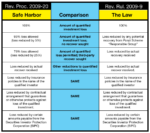Pre-Immigration Income Tax Planning — Avoiding Tax Traps Before Coming To The United States
This presentation discuss what I am calling pre-immigration income and estate tax planning for the alien individual. What I mean by this subject, is that if a non U.S. citizen knows that they are coming to the United States for either a long period of time or to obtain a green card which is permanent residency, or to obtain citizenship, they must be aware of the U.S. tax laws and the effect on them both before and after they immigrate to the U.S.
Very often the immigrating person is going to be a successful person who has earned money outside of the United States for a great part of their life and now will come to the United States and continue to be productive. The earnings that they have made outside of the United States before they became U.S. citizens may be accrued earnings. They may have gains from the assets they own or income that they will not collect that is not going to show up until after these people move to the United States. This is gains and wealth that has accrued before they come to the U.S. but they have not “realized and recognized” (a tax term) their gain.
For a simple example, I will tell you about a taxpayer who I saw when it was too late and after the fact early in my practice. This was an Ecuadorian man who lived in Ecuador up until he was 65 years old, and his whole life he had gathered Ecuadorian Indian art. His total cost of the art was about $50,000. He moved to the United States and became a U.S. tax resident and then the man decided to sell his art. He found out it was worth $3.5 Million. He came to me after he had made the sale. He never gave a thought to the fact that by selling something he had bought for $50,000 and sold for $3.5 Million, he would incur a U.S. tax on $3,450,000. However, every penny of gain that had accrued before he ever got to the U.S. was taxable. He did not “realize and recognize” his gain until after he was a U.S. taxpayer.
This seminar will discuss the tax planning techniques to preserve such wealth, earnings and fortunes, that the U.S. taxpayer who is immigrating to the U.S. has earned prior to their “tax residency”. We will examine how to avoid these traps.
We will also talk about how the immigrant to the United States will want to structure their wealth and income going forward after they become U.S. taxpayers, so they can increase their wealth; whether it be from foreign sources or sources in the United States, while paying the least amount of tax.
The seminar will discuss certain of the tax principals as they apply to an immigrant’s business, investments and gains commencing with their U.S. tax residency and some of the tax planning tools that most American taxpayers rely on to pay the minimum amount of U.S. taxes.
There is another major issue we will focus on.
We will discuss many of the “tax and information returns” that must be filed by the new immigrant U.S. taxpayer, who continues to have economic ties to their previous country of residency and/or other foreign interests.
After the nonresident alien has immigrated to the U.S., as a resident alien he or she will need to be aware not only of the taxes but also of the reporting requirements that may affect the immigrant once they have become U.S. taxpayers.
The United States requires all U.S. taxpayers with foreign business relationships to provide certain types of information (but not taxes), to the United States. These are known as Information Returns and are filed on a yearly basis.
First, we will talk about the wealth and income the immigrants earned before they came to the U.S. and how to preserve that wealth.
We are going to look first just at the income tax situation.
Then we will discuss the taxes imposed by the United States on transfers of assets that are the result of death (the Estate Tax) or gifts during life (the Gift Tax).
Then we will talk about how to preserve their wealth from high taxes after they become U.S. taxpayers. This will be “Tax Concepts for Immigrating Non Residents After They Have Become U.S. Taxpayers”.
The world is a global world today, and international tax issues are as prevalent as domestic tax issues in many parts of the United States. I hope you will realize from this seminar that you have a resource at your fingertips to help you.
– Richard S. Lehman, United States Tax Attorney







Leave a Reply